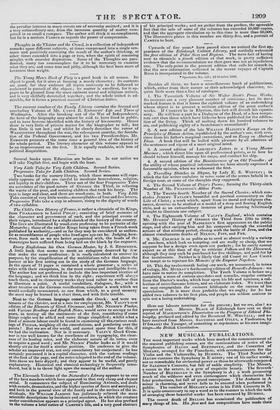Very little Tales for Very Little Children. Second Series. Progressive
Tales for Little Children. Second Series.
Two books for the nursery library, which those mammas will espe- cially approve of who are careful to inculcate benevolence, religion, and loyalty in their children. Three out of the four Progressive Tales are anecdotes of the good-nature of GEORGE the Third, in relieving the wants of the poor, and noticing children that took his fancy. The type is large and clear, and there are wood-cuts, in both. Very Little Tales consist of very little words--monosyllables of four and five letters. Progressive Tales take a step in advance, rising to the dignity of words two syllables.
The Child's Own History of France,is rather a chronicle of its Kings, from PHARAMOND to Louis Primo.; consisting of brief memoirs of the character and government of each, and the principal events of their reigns, introduced by a slight sketch of the history of the country. The lives are illustrated by wood-cuts professing to be portraits of the Monarchs ; those of the earlier Kings being taken from a French work published by authority,—and so far they may be considered as authen- tic as resemblances of people who lived ages ago can be. Judging, how- ever, from such as we are better acquainted with, the heads of the Sovereigns have suffered from being laid on the block by the engraver.
Every Englishman his Own German Master, by J. S. REISENDER. A little book that seems to merit an eulogium deserved by few that make the same profession : it is really calculated to answer its purpose, by the simplification of the multifarious rules that alarm the learner at his first setting out in the study of the German language. In the space of 71 pages is contained a whole grammar ; a series of rules with their exceptions, in the most concise and intelligible form. The author has not professed to include the less important niceties of the language; and we think him in the right : experience will always teach them, and in elementary works they tend rather to confuse than to illustrate a point. A useful vocabulary, dialogues, &c., with a short treatise on the German versification, complete a work which we would cordially recommend, as one from which, to a good memory the most may be learned in a short time, and with little trouble.
Next to the German language cometh the Greek : and were we, tenants of the cloister, and at a loss for employment, Mr. VALPY'S new edition of the Elements of Greek Grammar, and Mr. NEGRIS'S Pinder, with Various Readings and English Notes, would serve to occupy us for years, in testing all the statements of the first, considering if some things might not be added and some things simplified ; whilst what a fund of minute labour could be found in examining all the...various read- ings of PINDAR, weighing all the emendations, and pondering over the points ! But we are of the world, and cannot spare time for this, if we had the inclination. Nor is it necessary. VALPY'S Greek Gram- mar is too well known for the excellence of its typography, the clear- ness of its leading rules, and the elaborate nature of its notes, even to require a good word ; and Mr. NEGRIS' Pindar looks as if it would shortly alt tin for itself a similar position. He professes to give the scholar an improved text, not only emendatory but conjectural : he has certainly presented it in a capital character, with the various readings at the foot of the page, and the notes relegated to the end of the volume. Into these we have dipped; and they appear to be useful, and purely explanatory. Historical and classical archmology is frequently intro- duced, but it is to throw light upon the meaning of the author.


























 Previous page
Previous page